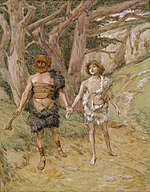Aclima
Aclima | |
|---|---|
| Other names | Kalmana, Calmana, Cainan, Luluwa, Awan |
| Spouse | Cain (after Abel's death) |
| Parent | Adam and Eve |
| Relatives | Azura (sister) Cain (brother) Abel (brother) Seth (brother) |
Aclima (also Kalmana, Lusia, Cainan, Luluwa, or Awan) according to some religious traditions was the oldest daughter of Adam and Eve and the sister (in many sources, the twin sister) of Cain. This would make her the first woman to be born naturally.
Genesis 4:17 states that after he had killed Abel, "Cain knew his wife, and she conceived and bore Enoch". In an effort to explain where Cain and Abel acquired wives, some traditional sources stated that each child of Adam and Eve was born with a twin who became their mate.
Aclima and Lusia
[edit]In Muslim tradition, Cain was born with a twin sister named Aclima, and Abel with a twin sister named Azura. Adam wished Cain to marry Abel's twin sister and Abel to marry Cain's. Cain did not consent to this arrangement, and Adam proposed to refer the question to God by means of a sacrifice. God rejected Cain's sacrifice to signify his disapproval of his marriage to Aclima, his twin sister, and Cain slew his brother in a fit of jealousy.[1][2][3]
In another Muslim tradition, Cain's twin sister was named Lusia, while Aclima was Abel's twin sister.[4]
In different sources, this name appears as Aclimah, Aclimia, Aclimiah, Klimia.[5] In the Cave of Treasures she is called Qelima.
Kalmana or Calmana
[edit]Some sources in the Eastern Orthodox traditions give Cain's twin sister the name Calmana, Calmanna, Azrun, or Azura.[5]
In the Jewish work Seder Hadorot, Cain's twin sister is called Kalmana, and Abel's twin sister called Balbira.[6][7]
Cain's sister is named Kalmana in the Apocalypse of Pseudo-Methodius (first Greek redaction) II.1.,[8] and Calmana in the Golden Legend. The poet Petrus Riga (1140–1209) included Calmana in his famous poem Aurora, and this could have been a source for her appearance in Peter Comestor's Historia Scholastica. Comestor's Biblical narrative text then served as the standard textbook for Biblical education for centuries.
Cainan
[edit]In an Armenian work republished in 1966, Cain's twin sister was named Cainan. This short work does not mention Cain's marriage.[9]
Luluwa
[edit]In the 6th-century apocryphal work Conflict of Adam and Eve with Satan, Cain's wife and twin is named Luluwa.[10]
Awan
[edit]According to the Book of Jubilees, Awan (also Avan or Aven, from Hebrew אָוֶן aven "vice", "iniquity", "potency") was the wife and sister of Cain and the daughter of Adam and Eve.[11]
See also
[edit]References
[edit]- ^ Brewer, E. Cobham. "Brewer's dictionary of phrase and fable." (1894).
- ^ Brewer, Cobham (2001). Wordsworth Dictionary of Phrase and Fable. p. 197.
- ^ "Cain", Dictionnaire des sciences occultes (Encycloedie Theologique Vol. 48), ed. Jacques Paul Migne, cols. 297–298.
- ^ Gibson, Margaret (2012). Apocrypha Arabica. Cambridge University Press. p. 11.
- ^ a b Burrington, Gilbert. An Arrangement of the Genealogies in the Old Testament and Apocrypha: To which are Added, from the Same Authorities, a Selection of Single Names, and Chronological Tables of the Kings of Egypt, Syria, and Assyria: with Notes Critical, Philological, and Explanatory; and Copious Indexes, in Two Volumes. Vol. 1. Rivington, 1836.
- ^ Seder Hadorot 8a
- ^ Abarbanel Gen. 4,1 as cited by Codex Judaica
- ^ A.C. Lolos, Die Apokalypse des Ps.-Methodios. Beiträge zur klassischen Philologie 83. Meisenheim am Glan: Hain, 1976.
- ^ Stone, Michael. "The Death of Adam—An Armenian Adam Book." Harvard Theological Review 59.3 (1966): 283-291
- ^ "First Book of Adam and Eve" and "Second Book of Adam and Eve", printed in Platt, Rutherford H. The Forgotten Books of Eden (annotated edition). Jazzybee, 2012.
- ^ The Empowerment of Women in the Book of Jubilees - Page 17, Betsy Halpern Amaru - 1999

